

Texts adopted - Thursday, 13 December 2012 - Situation in Ukraine - P7_TA-PROV(2012)0507. The European Parliament , – having regard to its previous resolutions and reports, in particular those of 1 December 2011 containing the European Parliament's recommendations to the Council, the Commission and the EEAS on the negotiations on the EU-Ukraine Association Agreement(1) and of 24 May 2012 on the situation in Ukraine and the case of Yulia Tymoshenko(2) , – having regard to the interim reports and preliminary conclusions of the OSCE/ODIHR election observation mission to Ukraine, in particular the Statement of Preliminary Findings and Conclusions, issued on 29 October 2012 jointly with the OSCE Parliamentary Assembly, the Parliamentary Assembly of the Council of Europe, the European Parliament and the NATO Parliamentary Assembly, – having regard to the joint statement on the parliamentary elections in Ukraine issued by High Representative Catherine Ashton and Commissioner Štefan Füle on 12 November 2012,
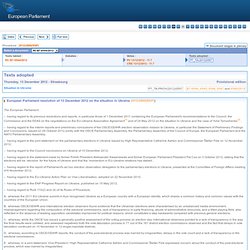
What the European Union said in 2012 about its current fascist allies in Ukraine. By Alex Lantier 12 March 2014 Since last month’s putsch in Kiev, the US and European media have denounced reports from Russia and internationally of fascist involvement in the new, Western-backed Ukrainian regime.
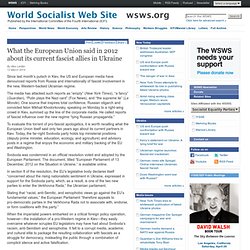
The media has attacked such reports as “empty” (New York Times), “a fancy” (Guardian), “Putin plays the Nazi card” (Fox News), and “the supreme lie” (Le Monde). One source that inspires total confidence, Russian oligarch and convicted felon Mikhail Khodorkovsky, speaking on Monday to a right-wing crowd in Kiev, summed up the line of the corporate media. He called reports of fascist influence over the new regime “lying Russian propaganda.”
To evaluate this torrent of pro-fascist apologetics, it is worth recalling what the European Union itself said only two years ago about its current partners in Kiev. How the far-right took top posts in Ukraine's power vacuum. NEO-NAZI Symbols BECOME “The NEW Normal” Then What “Democratization”? “Democratization” and Anti-Semitism in Ukraine: When Neo-Nazi Symbols Become “The New Normal” Dmitry Yarosh (center), leader of the Maidan Brown Shirts, on an international wanted list and charged with inciting terrorism.
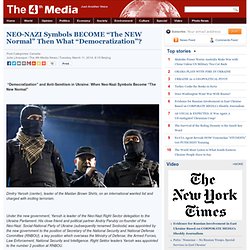
Maidan People's Union. The Maidan People's Union (Ukrainian: Народне об'єднання "Майдан") is an alliance in Ukraine formed by several political parties and non-partisan individuals and public organizations on the fifth Sunday (22 December 2013) of the Euromaidan-protests with the aim of "building a new Ukraine and a new Ukrainian government" [2] by creating a new Ukrainian constitution, and removing corrupt judges and prosecutors.[1][3] It also aims to organize opposition to the current regime and to coordinate the protest movement in all regions of the country.[2] In practise this means broadening support for the goals of the organization in the pro-government and pro-presidential heartland East Ukraine.[4] History[edit] Agenda[edit] The organization has set several goals: Organization[edit] Notes[edit] References[edit] External links[edit] Official website (Ukrainian)
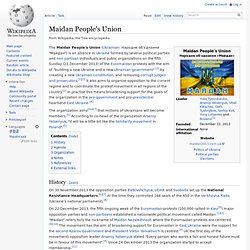
Yatsenyuk Government. A government headed by Arseniy Yatsenyuk was created in Ukraine in the aftermath of the Ukrainian revolution.
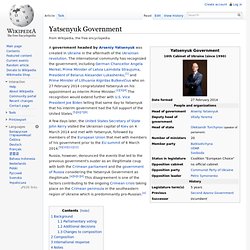
The international community has recognized the government, including German Chancellor Angela Merkel, Prime Minister of Latvia Laimdota Straujuma, President of Belarus Alexander Lukashenko,[1] and Prime Minister of Lithuania Algirdas Butkevičius who on 27 February 2014 congratulated Yatsenyuk on his appointment as interim Prime Minister.[2][3][4] The recognition would extend further with U.S. Vice President Joe Biden telling that same day to Yatsenyuk that his interim government had the full support of the United States.[5][6][7][8] A few days later, the United States Secretary of State John Kerry visited the Ukrainian capital of Kiev on 4 March 2014 and met with Yatsenyuk, followed by members of the European Union that met with members of his government prior to the EU summit of 6 March 2014.[9][10][11][12] Background[edit] Parliamentary voting[edit] Additional decisions[edit]
Katya Gorchinskaya: The not-so-revolutionary new Ukraine government. The Cabinet of Ministers brought to the helm by the EuroMaidan revolution, is a motley crew indeed: A combination of old faces tainted by allegations of corruption, newly emerged revolutionary heroes and appointees who are able to make a difference.
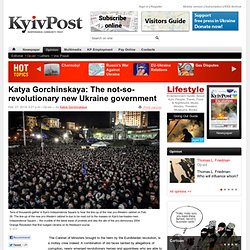
The new government, most of which was appointed by constitutional majority, be an interesting one to watch, but can hardly be called a technocratic one. The newly approved Cabinet has 21 members, and is heavy on members of ex-Prime Minister Yulia Tymoshenko’s Batkivshchyna Party. Vitali Klitschko’s Ukrainian Democratic Alliance for Reform is not represented after turning down offers. Their exclusion highlights the growing rift between UDAR and Batkivshchyna, whose leaders will most likely compete in the early presidential election on May 25.
Svoboda, the ultra-nationalist party, received several key positions in the government on top of the general prosecutor's office, which it already oversees. Arseniy Yatseniuk Arseniy Yatseniuk Vitaliy Yarema. Watch Your Tongue: Language Controversy One Of Fundamental Conflicts In Ukraine. Interim President Oleksandr Turchynov has since vetoed that repeal, but the episode has alarmed many of Ukraine’s Russian speakers and others.
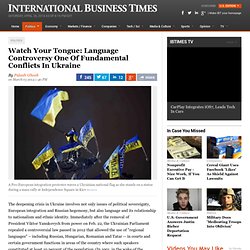
“Just as the law itself was meant to validate the continued use of Russian in Ukraine for a wide range of activities, the move to cancel that law was perceived as taking away rights enjoyed by the Russian-speaking population, and potentially a sign that there might be growing discrimination against them,” explained Olga Oliker, a security and defense analyst at the RAND Corp. Indeed, after the 2012 law was passed, 13 of Ukraine’s 27 regions, mostly in the industrial eastern parts of the country, quickly adopted Russian as a second official language.